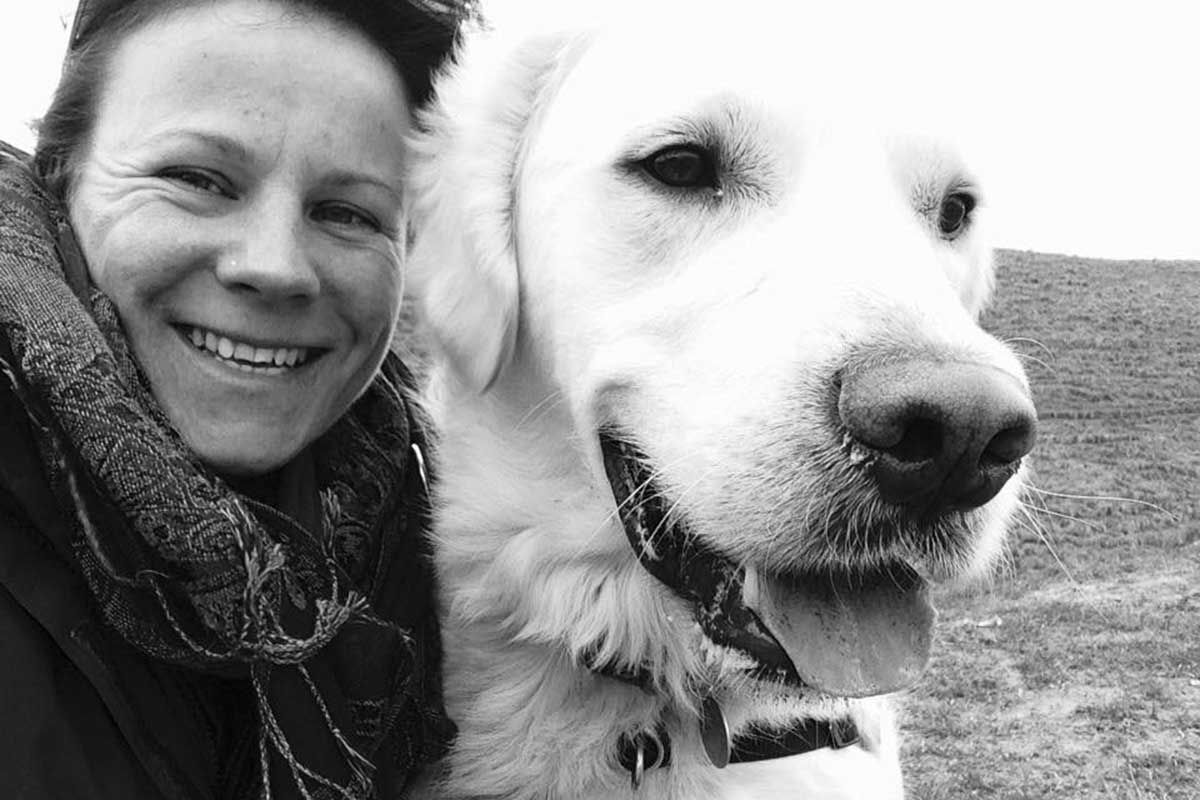The Grieving Process When Losing a Dog: Navigating Heartbreak
Losing Stanley in July has bought up a lot of stuff for me. I am no stranger to grief as I lost my Dad nine years ago. But Stanley and Hounds & Hooves were a huge part of me navigating the grief at that time. So even though I have been through it before, I naively thought that if you have been through it once then you find it easier the next time. I couldn’t have been more wrong. My mental health has suffered greatly; I am not sure if it’s because I feel some guilt - I am a dog trainer, why didn’t I spot the signs earlier? I know this is a stupid notion, because dogs hide their pain well, and also because of lengthy talks with the vet that the type of cancer he had wouldn’t have been noticeable until it was too late. Did I do enough for him in his life, did he know he was my whole life?
Losing a beloved pet is a heart-wrenching experience that can leave a lasting impact on any dog owner. Dogs hold a special place in our hearts and become not just pets, but members of our family. When we lose a dog, we mourn their loss in a unique way that requires us to navigate through the grieving process. This blog explores the stages of grief and provides some tips for coping with the heartbreak caused by losing a dog.
1. Denial and Shock
The initial stage of grief often involves disbelief and shock. It can be difficult to accept the reality of our dog's passing, causing us to deny the truth for a period of time. Feelings of emptiness and confusion are common during this phase. It's important to remember that these emotions are natural and part of the healing process. Stanley’s decline was so rapid and even with my L3 OCN first aid qualification (which I am sooooo grateful for) I hadn’t ever been in a position like that with any dog, let alone my own. He was in the most horrific state. Everything was so quick. I even remember asking (selfishly) if there was any way we could make him comfortable for the weekend so we could do one last walk. I remember a couple of weeks after we lost him, I made a mackerel salad; I always saved the skins of any fish we ever had and I put them on a little side plate. Only to realise a couple of minutes later that he was no longer around to save them for.
2. Anger and Guilt
As reality sets in, it is common to feel anger and guilt. Anger may be directed towards ourselves, as we might question if we could have done more to prevent our dog's death. Guilt can arise from thoughts of not spending enough time with our beloved furry friend or making decisions that we perceive as failures. It is essential to acknowledge these emotions and remind ourselves that we did the best we could for our dog. I know that throughout Stanleys life he was given the absolute best of everything. I have questioned myself a lot over this time, whether I should have done more activities and more formal training with him. But honestly, he wasn’t that type of dog. He went to training classes continuously from puppy to four years old, I trained with him daily and eventually he became the most incredible stooge dog, but we didn’t do lots of paid activities together. I’ve asked myself many a time if I should have done more of those things with him. But it wasn’t something we enjoyed together - I would feel anxious and stress beforehand and he would pick up on it. Now getting him down the beach or to a forest he really came alive and, in his time, we did many hikes and camping trips. He loved nothing more than being with his people. He wasn’t really bothered about hanging out with other dogs but he loved his people hard. He was at his most happy when he was with Rich, the boys and I, being included in whatever it was we were doing.
3. Sadness and Depression
The sadness we feel after losing a dog can be overwhelming. It is perfectly normal to experience deep grief, as we mourn the loss of a loyal companion. Feelings of depression may accompany this stage, leading to a lack of interest in usual activities and difficulty in finding joy. It is important to allow ourselves time to grieve and reach out for support from friends, family, or even professional help if needed. I am not ashamed to admit my mental health has suffered greatly, there were other things that contributed to this but Stanley was the catalyst. I desperately miss his little quirks and the time we would spend together.
After I stopped running the group dog walks for Hounds & Hooves, I would look forward to my walks and adventures with Stanley. It felt weird to walk alone. I hated leaving the house because when I returned the silence was deafening and I still avoid going to the office now because he was the whole reason Hounds & Hooves became a thing - he was the dog that made me want to be a trainer.
4. Acceptance and Healing
Eventually, we begin to move towards acceptance and healing. While it may take time, we start to accept the reality of our dog's passing and adjust to life without them. Memories of our furry friend will always remain, but we learn to cherish the moments shared and the unconditional love they brought into our lives. Healing is a personal journey, and no set timeline should be imposed. Each person's path is unique, and it's crucial to be patient with ourselves during this process. I will admit, I am not quite there yet. I am dreading our first Christmas without him. He was involved in every aspect, from picking the tree to helping decorate, to getting his own advent calendar, Christmas dinner and stocking.
5. Knowing when the time is right to get another dog
I am not an expert here. It’s a really personal journey, and there isn’t a right answer. I worry that if we get a new dog too soon, they won’t measure up to Stanley; I worry that if we leave it too long, that won’t feel right either. I don’t see myself without a dog for a prolonged period of time, but as a dog trainer there’s a tendency to feel under pressure to get everything “right”. I know a lot more now than I did ten years ago, but every dog is an individual and any new addition is likely to present its own challenges. Dog trainers don’t have all the answers.
We have the added pressure that our son has additional needs; so, whilst I know the therapeutic pros can outweigh the cons, I don’t want to put pressure on my son or on a new dog and get it wrong for either of them. I am pretty sure we will end up with another Golden Retriever, but I have also always had this dream of offering homes to senior dogs that have been given up for one reason or another, being able to offer them a warm fire and a comfy couch to live out their golden years. Maybe I am putting too much pressure on myself and setting my expectations too high – only time will tell. And time is what’s important.
Coping Tips for Healing from the Heartbreak
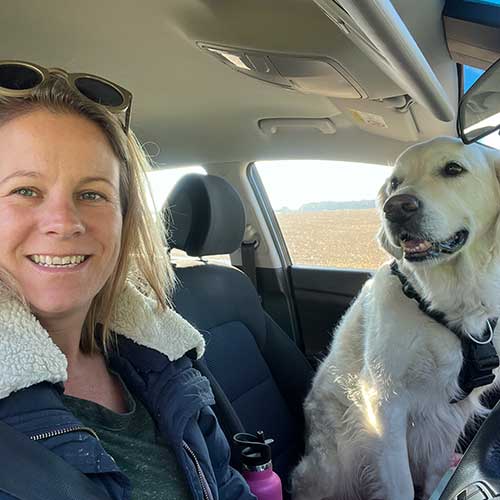

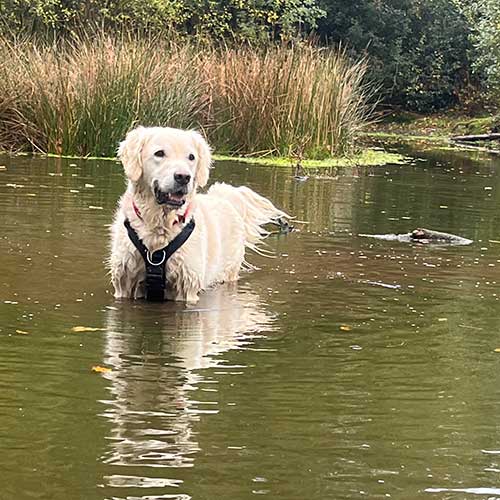

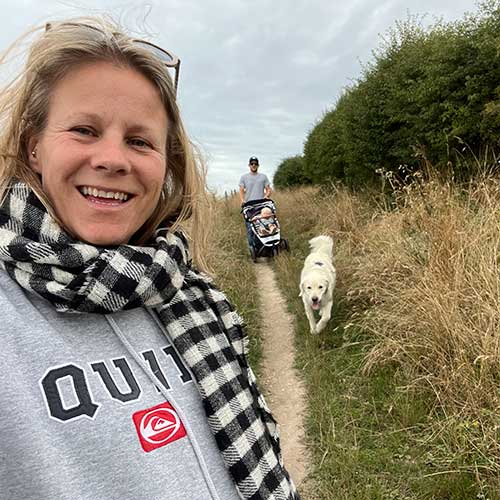

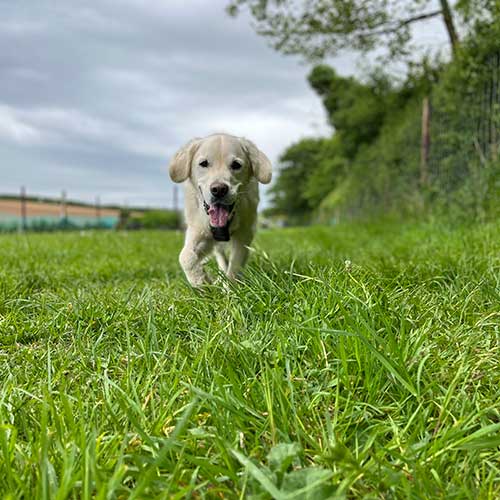

Allow Yourself to Grieve:
Give yourself permission to experience the emotions that come with grieving. Do not suppress your feelings; it's okay to cry and express your sorrow. I spent weeks not being able to pass his harness without giving it a sniff and then having a good old cry. Where children are concerned, for us it worked really well to explain that Stanley had been really poorly and had died. We allowed our eldest to ask for bedtime stories with Stanley in and both of them still refer to The Gallops as Stanley’s field.
Create a Memorial:
Honouring your dog's memory can bring a sense of closure. Create a memorial such as a photo album, a painted portrait, or plant a tree in their memory. We got Stanley cremated, and, when we are ready, we have a huge list of places we are going to take him to scatter his ashes. He was part of so many things, I feel like I want to recreate those things one last time for a final resting place. In addition, I also asked for a lock of hair from behind his ears-you know the bit: it’s almost like puppy fur, unbelievably soft with its own unique smell, completely different to any other part of the body.
Seek Support:
Reach out to family, friends, or support groups who understand the pain of losing a pet. Sharing memories and emotions can help in the healing process. Not everyone will be able to understand the emotions you are working through. We were inundated with well wishes from complete strangers who had followed Stanley’s journey throughout Hounds & Hooves and equally those that had met him and spent time with him. Lean on friends and family who want to support you and lift you up and share in those wonderful memories; these are the people who will guide you through the heartache.
Take Care of Yourself:
Take care of your physical and emotional well-being. Ensure you are eating well, getting enough rest, and engaging in activities that bring you comfort and joy. With two young children and a business to run, this has been no mean feat. However, we have an amazing team at Hounds & Hooves and along with the support of friends and family we have been able to find time to implement self-care.
Consider Professional Help:
If you find it difficult to cope with the heartbreak and are struggling to heal, don't hesitate to seek the help of a therapist or grief counsellor who specialises in pet loss. There are a variety of free and paid resources available to help you navigate this.
Final Thoughts
Losing a dog is undoubtedly one of the most challenging experiences for a dog owner. The grieving process may be long and painful, but it is an essential part of healing and moving forward. Remember that it is okay to feel heartbroken and to take the time needed to heal. Cherish the memories of your beloved pet and know that the love they brought into your life will never fade. Try not to feel pressured into getting another dog until you are ready. Remember that getting a new dog won’t erase all the wonderful memories you have of your furry friend and they won’t replace that time you had together. But they will help you create new memories.

